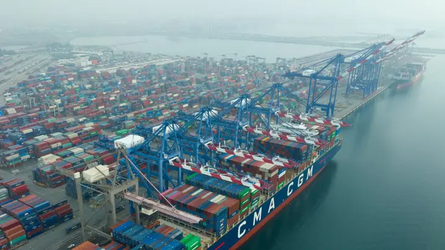- Joined
- Feb 3, 2021
Longshoremen union's demand for total ban on automation questioned as port strike looms (archive)
As thousands of dockworkers are preparing to strike should a deal not be reached by the end of Monday, one business leader is questioning the union’s demand for a total ban on automation.
International Longshoremen's Association (ILA) on Sunday said its 85,000 members, along with "tens of thousands of dockworkers and maritime workers around the world," will hit the picket lines Tuesday "and strike at all Atlantic and Gulf Coast ports from Maine to Texas."
The union is demanding higher wages and a total ban on the automation at ports regarding cranes, gates and moving containers in the loading and unloading of freight.
Benchmark Capital's Bill Gurley reacted on social media to the union’s demands, writing that the federal government should step in if the union seeks a total ban on automation.
PORT EMPLOYERS MEET WITH BIDEN ADMINISTRATION AS POTENTIAL STRIKE LOOMS
"Outlawing the effective use of technology will unquestionably doom our nation," Gurley wrote. "We will become globally uncompetitive."
The ILA and United States Maritime Alliance (USMX), which represents employers at the 36 seaports that could be affected by the strike, have been at an impasse over issues including wages and automation at ports.

The White House confirmed that administration officials have met with both parties and urged them to keep negotiating. (Qian Weizhong/VCG via Getty Images, File / Getty Images)
"United States Maritime Alliance (USMX) refuses to address a half-century of wage subjugation where Ocean Carriers profits skyrocketed from millions to mega-billion dollars, while ILA longshore wages remained flat," the ILA said Sunday.
A White House official on Friday confirmed to Fox Business that senior officials from the White House, Labor Department and Department of Transportation have met with the parties ahead of the potential strike, urging them to return to the table to negotiate "in good faith fairly and quickly."
A potential port strike would disrupt a variety of export and import shipments from East Coast and Gulf Coast ports.
An analysis by J.P. Morgan estimated a strike would cost the U.S. economy up to $5 billion per day.
What products would be disrupted by a port strike? (archive)
A looming strike by roughly 45,000 unionized dockworkers at seaports on the East and Gulf coasts could begin next week and disrupt shipments of a variety of products as the presidential election approaches.
One-half of the seaborne imports to the U.S. are shipped through the 36 ports that would be impacted by a strike that may begin on Oct. 1. It would be the first strike by the International Longshoremen's Association (ILA), which represents the port workers, since 1977.
The union and the U.S. Maritime Alliance (USMX), which represents port employers, are at an impasse over wages in a new contract. As of Sunday, talks between the ILA and USMX appeared to be at a standstill, with each issuing statements about the impasse.
If the strike occurs next week, it would disrupt billions of dollars in imports ranging from cars and auto parts to agricultural commodities and consumer goods. The potential work stoppage comes as the U.S. election season heats up and Americans begin planning purchases for the upcoming holiday season.
US GROCERY STORES COULD BE WITHOUT POPULAR FRUIT WITHIN WEEKS AS 45,000 DOCKWORKERS THREATEN TO STRIKE
The ports that would be affected by the strike handled $37.8 billion in vehicle imports in the 12-month period through the end of June 2024, according to S&P Global Market Intelligence.
The Port of Baltimore leads the nation in car shipments, while auto parts are also a major import on the East Coast and Gulf of Mexico. Those ports also lead the U.S. in shipments of machinery, fabricated steel and precision instruments, according to S&P Global Market Intelligence data.
Agricultural products are also a significant import, as three-quarters of U.S. banana imports are from countries like Guatemala and Ecuador, Jason Miller, interim chair of Michigan State University's department of supply chains, told Reuters.

Agricultural products are also a significant import, as three-quarters of U.S. banana imports are from countries like Guatemala and Ecuador. (Fabian Sommer/picture alliance via Getty Images / Getty Images)
There would also be an impact on the $18.5 billion U.S. beef and pork export industry and the $5.8 billion poultry and egg export sector that is shipped in refrigerated containers.

Ranchers and farmers have begun culling their cattle herds due to drought and high costs in the region, threatening a potentially steep climb in prices for the country's supply of beef. (Brandon Bell/Getty Images / Getty Images)
Roughly 45% of all waterborne U.S. pork exports and 30% of beef exports were shipped via East Coast and Gulf Coast ports in the first seven months of this year, said U.S. Meat Export Federation spokesperson Joe Schuele.
In the pharmaceutical industry, over 91% of containerized imports and 69% of containerized exports of U.S. pharmaceutical products are handled by the affected ports, according to Everstream Analytics. More than 1-in-3 containers exported from the U.S. with life-saving medications leave from the Port of Norfolk in Virginia, while nearly 30% of containerized pharmaceutical imports enter the U.S. at the Port of Charleston in South Carolina, the firm noted.
Ports that would be affected by a strike bring in over half of the knitted and non-knitted apparel imported to the U.S., which is valued at $32.8 billion combined, as well as furniture valued at $23.4 billion, according to S&P Global Market Intelligence.
The White House previously signaled that President Biden wouldn't invoke the Taft-Hartley Act to impose a cooling-off period under which workers would go back to work for 80 days while negotiations continue.
"Since taking office, the Biden-Harris administration has developed a comprehensive whole-of-government approach to monitor and mitigate potential supply chain impacts, from severe weather to transport service interruptions to this spring's Key Bridge collapse in Baltimore," White House spokesperson Robyn Patterson told FOX Business.
"As part of this approach, we are monitoring and assessing potential ways to address impacts to U.S. supply chains related to operations at our ports, if necessary. That said, we continue to encourage the parties to continue negotiating towards an agreement that benefits all sides and prevents any disruption," Patterson added.
This one's potentially a big one. Considering how Biden/Harris wouldn't be able to just shrug this one off like the railworkers' strike that led to the East Palestine disaster, and considering how much of the plastic crap that we consume comes through ports from overseas, if this strike goes through on Tuesday even the most media-indoctrinated bugman is going to feel the effects. The request for a ban on automation is also a major factor here, since a big part of the Democrats' support comes from tech companies who believe they can automate anything with AI.
Fuck it up Joe!
Last edited: